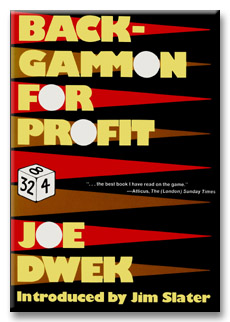
|
Backgammon Books

|
 |
|
|
|
| |
|
Backgammon for Profit
|
| |
|
|

|
|
AUTHOR:
|
|
Joe Dwek
|
|
YEAR:
|
|
1976
|
|
PUBLISHER:
|
|
A Scarborough Book, Stein and Day Publishers
|
|
CITY:
|
|
New York
|
|
ISBN:
|
|
0-8128-2313-3
|
|
BINDING:
|
|
Softcover
|
|
PAGES:
|
|
191
|
|
SIZE:
|
|
23 cm high, 16 cm wide
|
OTHER
EDITIONS:
|
|
Hardcover, 1975
|
READERS
COMMENTS:
|
|

| |
"If you can find it, I recommend Joe Dwek's Backgammon for Profit. It's laid out with one problem per page and explanatory material below each diagram. The problems are fairly easy to comprehend and the positions are useful. There are 120 problems, so you can get through it quickly and then go through it again a couple times to absorb the lessons."—Bob Stringer, September 2002
|
|
|


| |
"This book of backgammon problems is like other books in that it gives a problem and the solution. Unlike other books, the next problem will be almost identical to the first with a small difference in the situation and the solution. These subtle differences vividly display the variety of factors that need to be considered when making your move. Dwek explains the solutions well so there is no doubt afterwards that his solution is correct."—David McNeely, July 2001
|
|
|


| |
"A great book with the power to turn beginners into solid intermediates. Dwek covers much the same material as Magriel, albeit in a more conventional, problem-oriented rather than encyclopedic, manner. Many of the problems are far more complex than those found in the pristine, primary-color world of Magriel; and in fact, many of the solutions are in error. Still, Dwek's was certainly the most advanced and generally accurate book of its day.
Dwek and Magriel studied together shortly before they wrote their respective books, which may shed some light on why there is so much overlap between them."—Jeremy Bagai, in Classic Backgammon Revisited, March 2001
|
|
|


| |
"If you can find it, I recommend Joe Dwek's Backgammon for Profit. It's laid out with one problem per page and explanatory material below each diagram. The problems are fairly easy to comprehend and the positions are useful. There are 120 problems, so you can get through it quickly and then go through it again a couple times to absorb the lessons."—Bob Stringer, September 2002
|
|
|


| |
"This book of backgammon problems is like other books in that it gives a problem and the solution. Unlike other books, the next problem will be almost identical to the first with a small difference in the situation and the solution. These subtle differences vividly display the variety of factors that need to be considered when making your move. Dwek explains the solutions well so there is no doubt afterwards that his solution is correct."—David McNeely, July 2001
|
|
|


| |
"A great book with the power to turn beginners into solid intermediates. Dwek covers much the same material as Magriel, albeit in a more conventional, problem-oriented rather than encyclopedic, manner. Many of the problems are far more complex than those found in the pristine, primary-color world of Magriel; and in fact, many of the solutions are in error. Still, Dwek's was certainly the most advanced and generally accurate book of its day.
Dwek and Magriel studied together shortly before they wrote their respective books, which may shed some light on why there is so much overlap between them."—Jeremy Bagai, in Classic Backgammon Revisited, March 2001
|
|
|

|
|
CONTENTS:
|
|
| |
|
Forward by Jim Slater
Introduction
1. The Early Game
2. The Middle Game
3. The End Contact Game
4. Back Games
5. To Hit or Not to Hit
6. Duplicated Values
7. Prime v Prime
8. The Blitz
9. The Running Game
Tables
|
|
|
|
QUOTES:
|
|
"... the best book I have read on the game. Dwek knows a great deal about both backgammon and profit. He started out on Wall Street but from his first backgammon game in his early twenties he was hooked .... His particular style of play is calculated to gather a crowd wherever he goes: he invests the game with a tension that transforms it into a spectator sport .... I say there are few who will ever play like Dwek, although he's not so sure. 'I just may have given away too many trade secrets.'"—Atticus, The (London) Sunday Times
|
 |
|




















